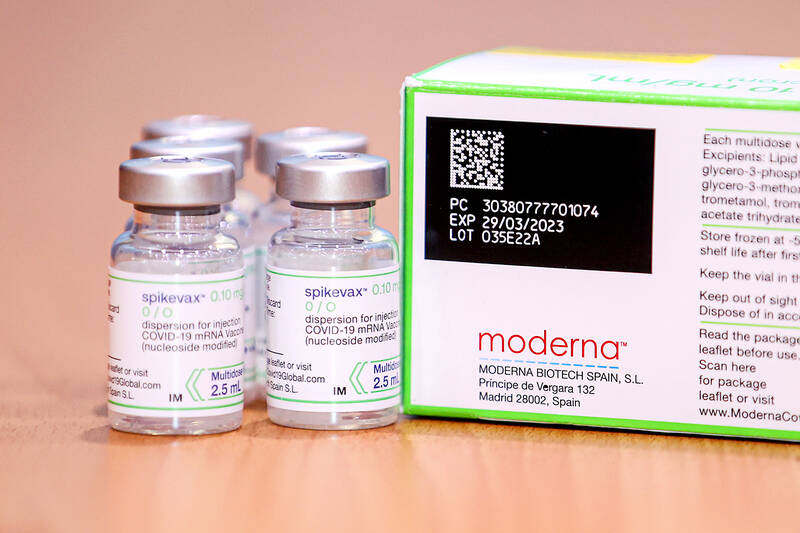Adolescents aged 12 to 17 can start receiving the Novavax COVID-19 vaccine from tomorrow, the Central Epidemic Command Center (CECC) said yesterday, adding that the second phase of inoculations using Moderna’s bivalent vaccine would begin next week.
The Ministry of Health and Welfare’s Advisory Committee on Immunization Practices has recommended that the Novavax vaccine can be administered to adolescents aged 12 to 17 as their primary series of vaccines or as a booster shot. It also allowed a mix-and-match approach.
The Novavax vaccine is a good choice for eligible recipients who are worried about possible adverse reactions from other COVID-19 vaccines, said Deputy Minister of Health and Welfare Victor Wang (王必勝), who heads the CECC.

Photo: CNA
People aged 12 or older who want to receive the Novavax vaccine as their primary series are advised to receive the same brand of vaccine for both of their doses, and receive them at least four weeks apart, advisory committee convenor and National Taiwan University Hospital pediatrician Lee Ping-ing (李秉穎) said.
People who have received other vaccine brands as their primary series can receive the Novavax vaccine as their booster dose, on condition that they receive it at least 12 weeks after the last dose of the primary series, he said.
Very common adverse reactions of the Novavax vaccine include headache, nausea or vomiting, muscle pain, joint pain, pain at the injection site, fatigue and weakness, which could occur in at least 10 percent of the recipients, Lee said.
Common adverse reactions include redness or swelling at the injection site, fever, chills and body aches, which could occur in less than 10 percent of recipients, he said.
Rare adverse reactions, such as a rash, swollen lymph nodes and hypertension, might not have been caused by the vaccine, but they were still reported, he added.
“Generally speaking, the risk of experiencing post-vaccination adverse reactions [from the Novavax vaccine] is low compared with other COVID-19 vaccines, and most are mild reactions, which do not require hospitalization,” Lee said.
Clinical trials of the vaccine have found that the most common adverse reactions are headache, fatigue and muscle pain, and that only about 6 percent developed a fever after getting the vaccine, which is less than the ratio for mRNA-based or recombinant COVID-19 vaccines, he said.
Wang said the second phase of inoculations using Moderna’s bivalent COVID-19 vaccine, which has been adapted to fight the Omicron variant of SARS-CoV-2, would begin on Monday next week.
Eligible recipients include healthcare workers; airport, harbor and quarantine workers; airline crew members and sailors; care facility and social welfare facility workers; people aged 50 to 64; and people aged 18 or older who are traveling abroad for diplomatic, public affairs or business purposes, he said.
The bivalent vaccine would be offered as a booster shot, he said.
It should be received at least 12 weeks (84 days) later than the previous shot — including the last dose of the primary series or the previous booster shot, he added.
People who want to receive the bivalent vaccine for overseas travel should bring either an invitation from abroad, an approval document from the competent government agency, or an approval document from their employer, along with their National Health Insurance card, COVID-19 vaccination certificate, also known as the “Yellow Card,” and plane tickets when getting vaccinated, the CECC said.

The manufacture of the remaining 28 M1A2T Abrams tanks Taiwan purchased from the US has recently been completed, and they are expected to be delivered within the next one to two months, a source said yesterday. The Ministry of National Defense is arranging cargo ships to transport the tanks to Taiwan as soon as possible, said the source, who is familiar with the matter. The estimated arrival time ranges from late this month to early next month, the source said. The 28 Abrams tanks make up the third and final batch of a total of 108 tanks, valued at about NT$40.5 billion

Travel agencies in Taiwan are working to secure alternative flights for travelers bound for New Zealand for the Lunar New Year holiday, as Air New Zealand workers are set to strike next week. The airline said that it has confirmed that the planned industrial action by its international wide-body cabin crew would go ahead on Thursday and Friday next week. While the Auckland-based carrier pledged to take reasonable measures to mitigate the impact of the workers’ strike, an Air New Zealand flight arriving at Taipei from Auckland on Thursday and another flight departing from Taipei for Auckland on Saturday would have to

A group from the Taiwanese Designers in Australia association yesterday represented Taiwan at the Midsumma Pride March in Melbourne. The march, held in the St. Kilda suburb, is the city’s largest LGBTQIA+ parade and the flagship event of the annual Midsumma Festival. It attracted more than 45,000 spectators who supported the 400 groups and 10,000 marchers that participated this year, the association said. Taiwanese Designers said they organized a team to march for Taiwan this year, joining politicians, government agencies, professionals and community organizations in showing support for LGBTQIA+ people and diverse communities. As the first country in Asia to legalize same-sex

MOTIVES QUESTIONED The PLA considers Xi’s policies toward Taiwan to be driven by personal considerations rather than military assessment, the Epoch Times reports Chinese President Xi Jinping’s (習近平) latest purge of the Chinese People’s Liberation Army (PLA) leadership might have been prompted by the military’s opposition to plans of invading Taiwan, the Epoch Times said. The Chinese military opposes waging war against Taiwan by a large consensus, putting it at odds with Xi’s vision, the Falun Gong-affiliated daily said in a report on Thursday, citing anonymous sources with insight into the PLA’s inner workings. The opposition is not the opinion of a few generals, but a widely shared view among the PLA cadre, the Epoch Times cited them as saying. “Chinese forces know full well that